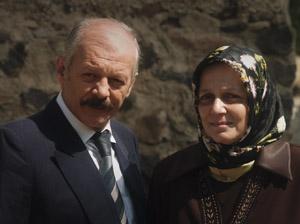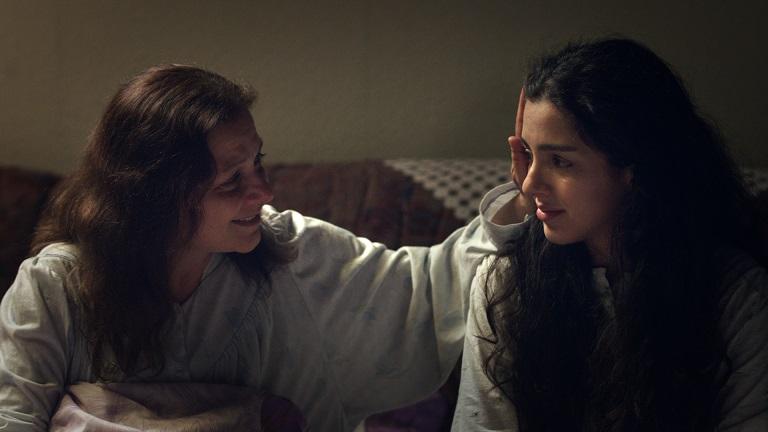It’s the women who keep things together in Umut Dağ’s debut feature Kuma, and you can see the weight of the burden that matriarch Fatma (Nihal G Koldas) has been carrying etched on her face. Fatma’s latest endeavour to preserve balance in her Vienna-based Turkish family goes further than before, and provides the first surprise in Dağ’s film.
Opening with the colourful atmosphere of a village wedding in Turkey, we assume that Fatma and her husband Mustafa (Vedat Erincin, below right, with Koldas) have married off their good-looking son Hasan (Muruthan Muslu) to the innocently youthful country girl Ayse (Begüm Akkaya). But there’s no honeymoon for the couple, and the family are back in their Vienna apartment the same evening.
 Which is where the director and his scriptwriter Petra Ladinigg first overturn our expectations. Given that the film’s title means “second wife” in Turkish, a spoiler alert shouldn’t be necessary, but we still feel a degree of shock when Ayse beds down with Mustafa rather than her new husband. Quite how Fatma has brokered this secret deal is something we never really learn, but it’s been driven by her progressing cancer, and the fear that after her death the family will be left motherless.
Which is where the director and his scriptwriter Petra Ladinigg first overturn our expectations. Given that the film’s title means “second wife” in Turkish, a spoiler alert shouldn’t be necessary, but we still feel a degree of shock when Ayse beds down with Mustafa rather than her new husband. Quite how Fatma has brokered this secret deal is something we never really learn, but it’s been driven by her progressing cancer, and the fear that after her death the family will be left motherless.
That’s not to say that the two elder daughters (pictured below left, with Fatma and Ayse) take easily to Ayse’s appearance in the household, though they have their own problems to deal with. Surrounding them is a world of relations and sometimes intrusive friends, with gossip aplenty in the local Turkish supermarket where the family shop, and where Ayse will later go to work. But the bonding between Fatma, especially when she’s at her sickest, and Ayse is strong, and only increases when the latter gives birth to a child of her own.
Director Dağ, who is himself Kurdish, brings on further surprise plot twists, one of which explains – not altogether unexpectedly, but movingly nonetheless – quite why son Hasan has agreed to go ahead with the subterfuge of his arranged marriage. Denouement comes when Ayse, who until then has been going along slavishly with everyone else’s wishes, finally realises she has feelings of her own.
 Kuma is an old-fashioned enough family drama that, in other hands, could have ended up in sitcom territory, but here resounds with feelings more often revealed through expressions rather than words. It’s not a film about integration, with dialogue largely in Turkish and most action set in the interiors of the family flat, well captured in Carsten Thiele’s cinematography. Nevertheless Ayse’s gradual progress in learning German hints at her moving into the wider surrounding world with which the rest of the characters have long been familiar. The family dynamics aren’t without incidental humour, either.
Kuma is an old-fashioned enough family drama that, in other hands, could have ended up in sitcom territory, but here resounds with feelings more often revealed through expressions rather than words. It’s not a film about integration, with dialogue largely in Turkish and most action set in the interiors of the family flat, well captured in Carsten Thiele’s cinematography. Nevertheless Ayse’s gradual progress in learning German hints at her moving into the wider surrounding world with which the rest of the characters have long been familiar. The family dynamics aren’t without incidental humour, either.
Koldas and Akkaya as Fatma and Ayse are both superb, and carry the film with its unspoken understandings, creating a mood of light profundity: emotions may appear on the closed side at first glance, but the feelings underneath ring true.















Add comment